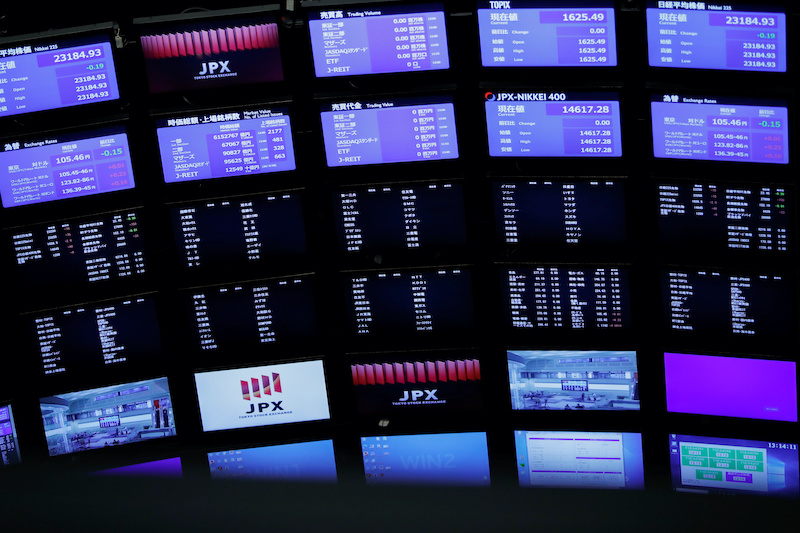Asian stocks suffered mixed fortunes on Monday despite the welcome news that US President Joe Biden was looking at lifting some of the tariffs imposed on Chinese goods by former president Donald Trump.
Tariffs on hundreds of billions of dollars of Chinese imports are set to expire in July and some key White House figures have argued they’re hurting US businesses and consumers more than their Chinese targets.
Biden’s comments came during a visit to Tokyo but his positive words weren’t enough to fuel a widespread rally across the region’s trading floors with concerns over inflation and growth continuing to weigh on sentiment.
Also on AF: Biden Says US Willing to Use Military Force to Defend Taiwan
Tokyo shares, though, closed higher with investors picking up growth stocks and eyeing steady gains in US futures.
The benchmark Nikkei 225 index added 0.98%, or 262.49 points, to end at 27,001.52, while the broader Topix index climbed 0.92%, or 17.20 points, to 1,894.57.
But Hong Kong stocks slipped, dragged down by tech titans such as Alibaba and food-delivery giant Meituan, which both dropped more than 3%. The Hang Seng Index fell 1.19%, or 247.18 points, to 20,470.06.
On the mainland, the Shanghai Composite Index ended flat, adding just 0.29 points to 3,146.86, while China’s second exchange, the Shenzhen Composite Index, rose 0.56%, or 11.09 points, to 1,994.76. The blue-chip CSI300 index fell 0.6%, to 4,053.98.
Singapore slipped 0.6% but most other Asian markets saw gains, with Seoul, Bangkok and Taipei in the green. Sydney ended marginally higher following the weekend election victory for the centre-left Labor party that ended a decade of conservative rule.
Indian stocks fell back with Mumbai’s signature Nifty 50 index down 0.32%, or 51.45 points, to close at 16,214.70.
Ukraine Fallout Persists
Globally, stocks hovered just above bear market territory as economic fallout from the war in Ukraine and persistently high inflation capped gains in equity benchmarks.
Oil rose, gold extended its recent gains, but the dollar slipped as investors cut their bets on further advances in the US currency from rising interest rates.
The MSCI all country index was up 0.16%, still down nearly 18% from its record high in January.
S&P 500 futures were up 0.7%, indicating a steady open in New York, though analysts sounded a note of caution.
The World Economic Forum is holding its first in-person meeting in two years in Davos, Switzerland over the coming four days, with central bankers and the International Monetary Fund officials participating in panels on the outlook for economies and inflation.
Dollar Index Slips
The dollar index, which tracks the US unit against a basket of currencies of other major trading partners, was down 0.3% at 102.60. The index rose by about 16% to a two-decade high over the 12 months to mid-May.
“The dollar may be carving out a peak, given Europe’s resilience to the energy shock and potential easing of lockdowns in China,” Commonwealth Bank of Australia strategist Joe Capurso said.
US crude gained 1% to $111.43 a barrel as the peak US holiday season driving looms. Brent crude rose 1.15% to $113.85 per barrel.
The concerns over global economic growth have prompted renewed support for gold.
“Gold prices saw the first weekly gain since mid-April as safe-haven demand was boosted by concerns over economic growth amid high inflation,” ANZ analysts said in a research note on Monday. “A weaker US dollar has also boosted investor appetite.”
Spot gold was 0.6% higher at $1,857.8 per ounce.
Key figures at around 0730 GMT
Tokyo – Nikkei 225 > UP 1.0% at 27,001.52 (close)
Hong Kong – Hang Seng Index > DOWN 1.2% at 20,470.06 (close)
Shanghai – Composite > FLAT at 3,146.86 (close)
West Texas Intermediate > UP 0.9% at $111.27 per barrel
Brent North Sea crude > UP 1.0% at $113.70 per barrel
New York – Dow > FLAT at 31,261.90 (Friday close)
London – FTSE 100 > UP 0.8% at 7,447.31
- Reuters with additional editing by Sean O’Meara
Read more:
China Offers Easier Capital Market Access to Covid-Hit Firms
China Covid Shutdowns Slash Lithium Demand, Halt Price Surge
























